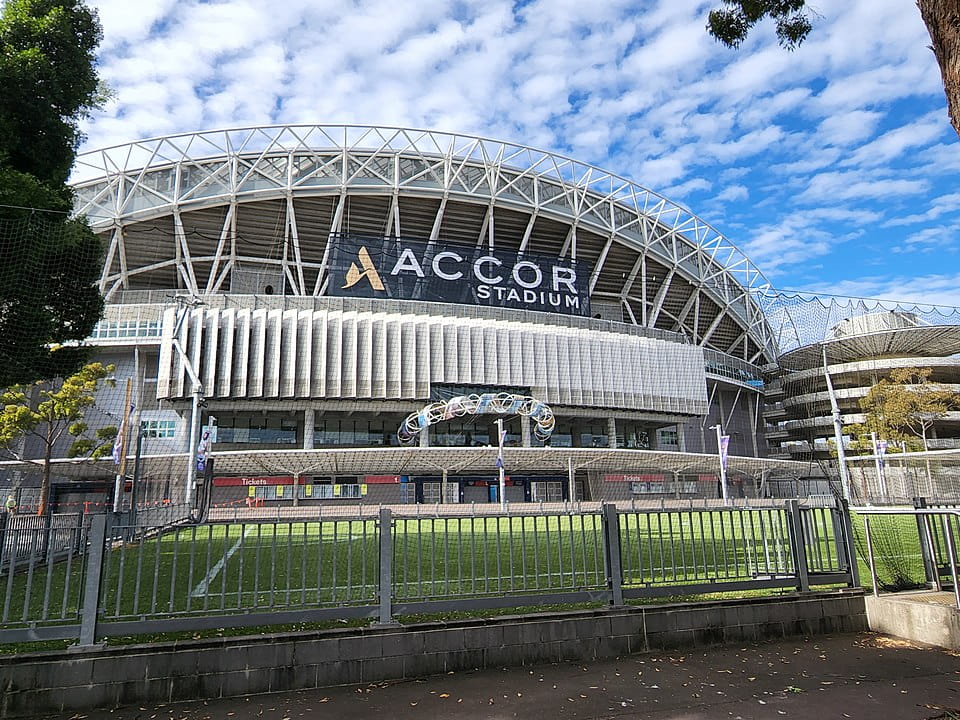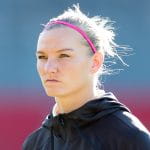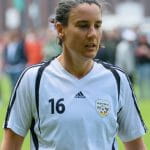The Women’s World Cup in Australia and New Zealand is probably the most important and widely anticipated sporting event in 2023. This famous competition has seen some memorable moments over the years, and after every tournament, it grows in popularity. Off the back of probably the most exciting men’s final in history, World Cup fever is rife at the moment and the perfect opportunity for the best women’s footballing nations to show the world what they are made of on the greatest of stages.
 Our extensive overview will take you through everything you need to know about the tournament, from the nations set to battle it out for glory to the schedule, venues, players to watch out for and more!
Our extensive overview will take you through everything you need to know about the tournament, from the nations set to battle it out for glory to the schedule, venues, players to watch out for and more!
When is the Women’s World Cup?
The women’s football world cup will take place between the 20th of July and the 20th of August 2023. The tournament is split into different stages: the group stage and the knockout rounds. Dates are carefully coordinated so that participating athletes have the time and space for rest, recovery and training.
The group stages will take place between the 20th of July and the 2nd of August whilst the later knockout stages will occur between the 5th and the 20th of August. Before the start of the tournament, the majority of the participating nations will likely arrive weeks before, partaking in pre-tournament preparations either in their respective countries or in Australia and New Zealand.3
Women’s World Cup 2023 Schedule
Below you’ll find a breakdown of the proposed World Cup schedule3. Be sure to keep the below dates in your calendar or check out FIFA’s Official Women’s World Cup page to make sure you don’t miss out on the action:
Overview of Scheduled Dates
- Group Stage – 20th July until 2nd August 2023
- Round of 16 – 5th August until 8th August 2023
- Quarter-Finals – 11th August until 12th August 2023
- Semi-Finals – 15th August until 16th August 2023
- Third Place Play-Off – 19th August 2023
- Final – 20th August 2023
When is the Women’s World Cup Final?
The Women’s World Cup Final Date is set for the 20th of August 2023.8 The fixture will be played at the Accor Stadium (Stadium Australia), Sydney in front of an 80,000-capacity crowd.
Where can I watch the Women’s World Cup in the UK?
If you are wondering how to watch the Women’s World Cup, British broadcasting giants ITV and the BBC are expected to battle it out for the rights to show the tournament in the UK7. This is especially good for football fans residing in the UK as they are public broadcasters, which means viewers will not need to watch games through a paywall or payment service.
However, according to The Evening Standard5, both channels have thus far had their World Cup broadcasting bids rejected by FIFA, meaning it is still undecided on who will get the rights to show the tournament. If you unable to watch a certain game, Women’s World Cup results and highlights are usually available on each team’s respective website or social media platforms after the match.
Who is Hosting This Year’s Tournament?
This year’s competition is taking place in Australia and New Zealand. The two neighbouring countries will share the responsibility of hosting the competition for the first time in their history. Initially, they faced competition from Argentina, Bolivia, Brazil, Colombia, Japan, Korea Republic, and South Africa for bidding rights. They were declared hosts on the 25th June 2020, beating Columbia in the final round of voting by 22 to 13.8
Host Cities and Venues
With this years women’s football World Cup being played in two nations, it is only natural that they both share the responsibility of hosting the football games. Below is an overview of the host cities and stadiums in Australia and New Zealand:
| Australia | New Zealand | ||
|---|---|---|---|
| Sydney | Accor Stadium (Stadium Australia) | Wellington | Wellington Regional Stadium |
| Perth | Perth Rectangular Stadium | Hamilton | Waikato Stadium |
| Melbourne | Melbourne Rectangular Stadium | Dunedin | Dunedin Stadium |
| Brisbane | Brisbane Stadium | Auckland | Eden Park |
| Adelaide | Hindmarsh Stadium | – | – |
Which Venue Will Host the Final?
The Stadium Australia (also known as the Accor Stadium) in Sydney will host the Women’s World Cup final. The 80,000 seater (with capabilities of temporary expansion) is the crown jewel of sports facilities in Australia.

Roadrunnerz45, CC BY-SA 4.0, via Wikimedia Commons
It has the capacity to hold major sporting events such as the Olympics, international rugby, and football, as well as American football and music concerts. This state-of-the-art stadium is the perfect location to host one of the most important sports events of the year.13
A Look at the Qualified Teams
In this year’s Women’s World Cup, 32 teams will battle it out for footballing glory. But with places still up for grabs, we don’t have the full picture of who will play in the competition. Below, we will give a breakdown of the status quo, explaining which nations have booked their tickets to Australia and New Zealand and those still yet to confirm their spots.
Women’s World Cup 2023 Groups
With the Women’s football World Cup Draw already taking place, the majority of the 29 teams who have already qualified know who awaits them in the group stages of the competition. Here is the group draw as it stands:
| Group A | New Zealand (hosts) | Norway | Philippines | Switzerland |
|---|---|---|---|---|
| Group B | Australia (hosts) | Republic of Ireland | Nigeria | Canada |
| Group C | Spain | Costa Rica | Zambia | Japan |
| Group D | England | Winner Group B Play-Off | Denmark | China PR |
| Group E | United States | Vietnam | Netherlands | Winner Group A Play-Off |
| Group F | France | Jamaica | Brazil | Winner Group C Play-Off |
| Group G | Sweden | South Africa | Italy | Argentina |
| Group H | Germany | Morocco | Colombia | Korea Republic |
England Lionesses will look at their group with intrigue, having been drawn against a stubborn Denmark and an unpredictable China PR. They will also have to wait for their final group challenger and could face the likes of Senegal, Haiti or Chile.
Inter-Confederation Play-Off
As you can see by the above world cup group draw, there are still spots to fill. That is because there are several Women’s World Cup play-off games to play, which will allow three more teams to enter the competition. The Inter-Confederation Play-Off will be held in New Zealand from the 17th to the 23rd of February 2023 and will determine the last three places in the competition.3
The groups are as follows:
| Group A | Group B | Group C |
|---|---|---|
| Portugal vs Cameroon/Thailand | Chile vs Senegal/Haiti | Chinese Taipei/Paraguay vs Papua New Guinea/Panama |
One team from each group will book their ticket to the tournament. From Group A, Cameroon and Thailand battle it out in the semi-finals to meet Portugal in the final. In Group B, Senegal and Haiti play for a chance to face Chile. In Group C, we have a semi-final double-header with Chinese Taipei and Paraguay locking horns to set up a date with either Papua New Guinea or Panama.
A Brief History of the Women’s World Cup
Although regular international matches and competitions took place beforehand, it wasn’t until 1991 that an official FIFA World Cup competition for women was established. Ladies World Cup football was first held in the Duangang Province, China, between the 16th and the 30th of November 1991.
The competition saw 12 teams battle it out for the prize of being the first ladies’ World Cup winners. The tournament winners were the USA, led by esteemed captain April Heinrichs. They defeated Norway 2-1 in the final after topping their group and dispatching Chinese Taipei and Germany along the road to World Cup glory.6
Nations with the most Women’s World Cup Wins
As the competition developed, a number of prominent nations rose to become the best and most dominant forces. Below is a list of the Women’s World Cup past winners:
| National Team | Women’s World Cup Wins | Tournament Dates |
|---|---|---|
| United States | 4 | 1991 / 1999 / 2015 / 2019 |
| Germany | 2 | 2003 / 2007 |
| Japan | 1 | 2011 |
| Norway | 1 | 1995 |
All-Time Top Goal Scorers
We all know football is a team game, but the Women’s World Cup has showcased some of the finest individual footballing talents over the years. But, who has the records to prove it? Here is an overview of the competition’s top goal scorers of all time:
| Rank | Player | National Team | World Cup Goals |
|---|---|---|---|
| 1 | Marta | Brazil | 17 |
| 2= | Birgit Prinz | Germany | 14 |
| 2= | Abby Wambach | United States | 14 |
| 4 | Michelle Akers | United States | 12 |
| 5= | Christian | Brazil | 11 |
| 5= | Sun Wen | China PR | 11 |
| 5= | Bettina Wiegmann | Germany | 11 |
The above table demonstrates the calibre of players that have made their mark on the tournament, and we think it’s only fair to go a little bit deeper into the history of these players to show you how much of an impact they had on the sport.
Marta
Marta Vieira da Silva, known more popularly as Marta, is a living legend of the women’s game. With over 171 caps and 115 goals for Brazil, Marta is regarded as one of the greatest to ever play the game. She is the record all-time goal scorer in World Cup history and the only player (male or female) to score at 5 FIFA World Cup tournaments.
At the age of 36, it will be interesting to see if the mercurial forward will make it to the 2023 World Cup, but she would undoubtedly offer experience, guile and an eye for goal to the Canarinhas this year.12
Birgit Prinz
A two-time World Cup winner and tormentor of defenders, Birgit Prinz was, at one time, one of the greatest strikers in world football. At the age of 16, she already made her senior debut and went on to accumulate 214 caps for Germany with 128 goals. 2003 saw the pinnacle of her international career, where she helped Germany to their first World Cup title and became the tournament’s best player and top goal scorer.11
Abby Wambach

By Abby_Wambach_USA_vs_Can_Sep17.jpg: Ampatent, derivative work: Hmlarson – This file was derived from: Abby_Wambach_USA_vs_Can_Sep17.jpg, CC BY 3.0, Link
Abby Wambach is third on our list of the best world cup scorers, and what better way to end the discussion! Mary Abigail Wambach is a United States National Hall of Famer, and one of the most prolific goal scorers in football history. She gained 255 caps for the US and scored an unimaginable 184 goals during her illustrious career.
To cap it off, the dominant forward ended her international career in a fairytale fashion. Prior to Canada 2015, she announced the tournament would be her last in the stars and stripes. She went on to triumph in the tournament, winning the World Cup before retirement.9
Teams to Watch in the Women’s World Cup 2023
This year’s tournament will undoubtedly provide some twists and turns along the way, and as football fans, we can only hope that there are some magical moments and World Cup upsets. But who are the teams that we expect to mount a serious challenge for the tournament? Below, we will discuss who are the favourites for the tournament and the key players we expect to flourish on the biggest stage.
*Data taken on the 21.12.20221,2,4
United States
It wouldn’t be a competition if the US was not involved in the mix. As the current Women’s World Cup holders, the ladies in stars and stripes are big favourites again this time round, having breezed through the CONCACAF W Championship qualification. They have a squad brimming with experience and talent, including the likes of veteran forwards Christie Rampone and Alex Morgan as well as the dynamic Sophia Smith.
Star Player – Alex Morgan

By Jamie Smed from Cincinnati, Ohio – Alex Morgan, CC BY 2.0, Link
- Date of Birth: 2nd July 1989
- Born: Diamond Bar, California
- Club: San Diego Wave FC
- Position: Forward
- International Appearances: 200*
- Goals: 119*
Germany
The two-time World Cup champions are another top contender for the title, as they look to bounce back from their narrow EUROs defeat at the hands of England in 2022. The Germans will be looking to the likes of clinical striker and captain Alexandra Popp (a big miss in the EUROs final) for inspiration, as well as the talented midfielder Lena Oberdorf and dead-ball specialist Lena Magull.
Star Player – Alexandra Popp

By Sven Mandel – Own work, CC BY-SA 4.0, Link
- Date of Birth: 6th April 1991
- Born: Witten, Germany
- Club: VfL Wolfsburg
- Position: Forward
- International Appearances: 124*
- Goals: 61*
England
Having won the Women’s Euros in 2022, the feel-good factor in the England Lionesses camp is rampant. Coached by the highly successful Sarina Wiegmann, we expect England to continue their form in the competition, having remained unbeaten in UEFA qualification and possessing a wealth of talent from women’s football teams across the UK and abroad. The Lionesses can call on players such as the devastating wingback Lucy Bronze, tricky forward Alessia Russo and Chelsea’s midfield maestro Fran Kirby.
Star Player – Lucy Bronze
- Date of Birth: 28th October 1991
- Born: Berwick-Upon-Tweed, England
- Club: FC Barcelona
- Position: Defender
- International Appearances: 100*
- Goals: 11*
FAQs
Below, we will tackle the most frequently asked questions surrounding the Women’s World Cup 2023. Please refer to the FAQs if you have questions that the above article may not have answered already.
Who will host FIFA Women's World Cup in 2023?
The hosts for the Women's World Cup in 2023 are Australia and New Zealand. The competition will be shared between the neighbouring nations, and matches will be played in cities from Sydney to Auckland. They won their bid to host the competition back in 2020.
What teams have qualified for the Women's World Cup 2023?
So far, the following 29 countries have qualified for the Women's World Cup 2023: New Zealand (hosts), Norway, Philippines, Switzerland, Australia (hosts), Republic of Ireland, Nigeria, Canada, Spain, Costa Rica, Zambia, Japan, England, Denmark, China PR, United States, Vietnam, Netherlands, France, Jamaica, Brazil, Sweden, South Africa, Italy, Argentina, Germany, Morocco, Colombia and Korea Republic.
Has England qualified for the Women's World Cup 2023?
Yes, the England Lionesses have qualified for the Women's World Cup 2023, and are regarded as one of the tournament favourites, having recently triumphed in last year's EURO 2022. They have been drawn into Group D alongside Denmark and China PR.
Who won the last Women's World Cup?
The current Women's World Cup holders are the United States. In France 2019, they defeated the Netherlands 2-0 to be crowned world champions with goals from Megan Rapinoe and Rosemary Lavelle.10 They are also firm favourites for this year's tournament.
Who has the most Women's Football World Cup titles?
The nation with the most FIFA Women's World Cup titles is the United States. They won the competition on four separate occasions: in 1991, 1999, 2015 and 2019 respectively. They have also finished runner's-up once (in 2011) and third place on three separate occasions (1995, 2003, 2007).10
Sources
- DFB – Deutscher Fußball-Bund e.V (n.d). German Women’s National Football Team (in English). Accessed on December 21, 2022 from https://www.dfb.de/en/national-teams/womens-national-team/team/
- The Football Association (n.d). Lucy Bronze. Accessed on December 21, 2022 from https://www.englandfootball.com/england/womens-senior-team/squad/lucy-bronze
- UEFA (n.d). 2023 FIFA Women’s World Cup finals: Australia/New Zealand. Accessed on December 21, 2022 from https://www.uefa.com/womensworldcup/about/
- U.S. Soccer 2023 (n.d). Alex Morgan. Accessed on December 21, 2022 from https://www.ussoccer.com/players/m/alex-morgan
- The Evening Standard (20.10.2022). Women’s World Cup: UK TV rights bid rejected as Fifa chief tells broadcasters to ‘pay what the game deserves’. Accessed on Accessed on December 21, 2022 from https://www.standard.co.uk/sport/football/womens-world-cup-tv-rights-fifa-b1034039.html
- 1991 FIFA Women’s World Cup (2022, December 13). In Wikipedia. https://en.wikipedia.org/w/index.php?title=1991_FIFA_Women%27s_World_Cup&oldid=1127184243
- 2023 FIFA Women’s World Cup broadcasting rights (2022, December 19). In Wikipedia. https://en.wikipedia.org/w/index.php?title=2023_FIFA_Women%27s_World_Cup_broadcasting_rights&oldid=1128375866
- 2023 FIFA Women’s World Cup (2022, December 20). In Wikipedia. https://en.wikipedia.org/w/index.php?title=2023_FIFA_Women%27s_World_Cup&oldid=1128414394
- Abby Wambach (2022, November 26). In Wikipedia. https://en.wikipedia.org/w/index.php?title=Abby_Wambach&oldid=1124006361
- FIFA Women’s World Cup (2022, December 20). In Wikipedia. https://en.wikipedia.org/w/index.php?title=FIFA_Women%27s_World_Cup&oldid=1128453548
- Birgit Prinz (2022, September 24). In Wikipedia. https://en.wikipedia.org/w/index.php?title=Birgit_Prinz&oldid=1112140550
- Marta (footballer) (2022, December 20). In Wikipedia. https://en.wikipedia.org/w/index.php?title=Marta_(footballer)&oldid=1128447648
- Stadium Australia (2022, Decemeber 5). In Wikipedia. https://en.wikipedia.org/w/index.php?title=Stadium_Australia&oldid=1125772833


